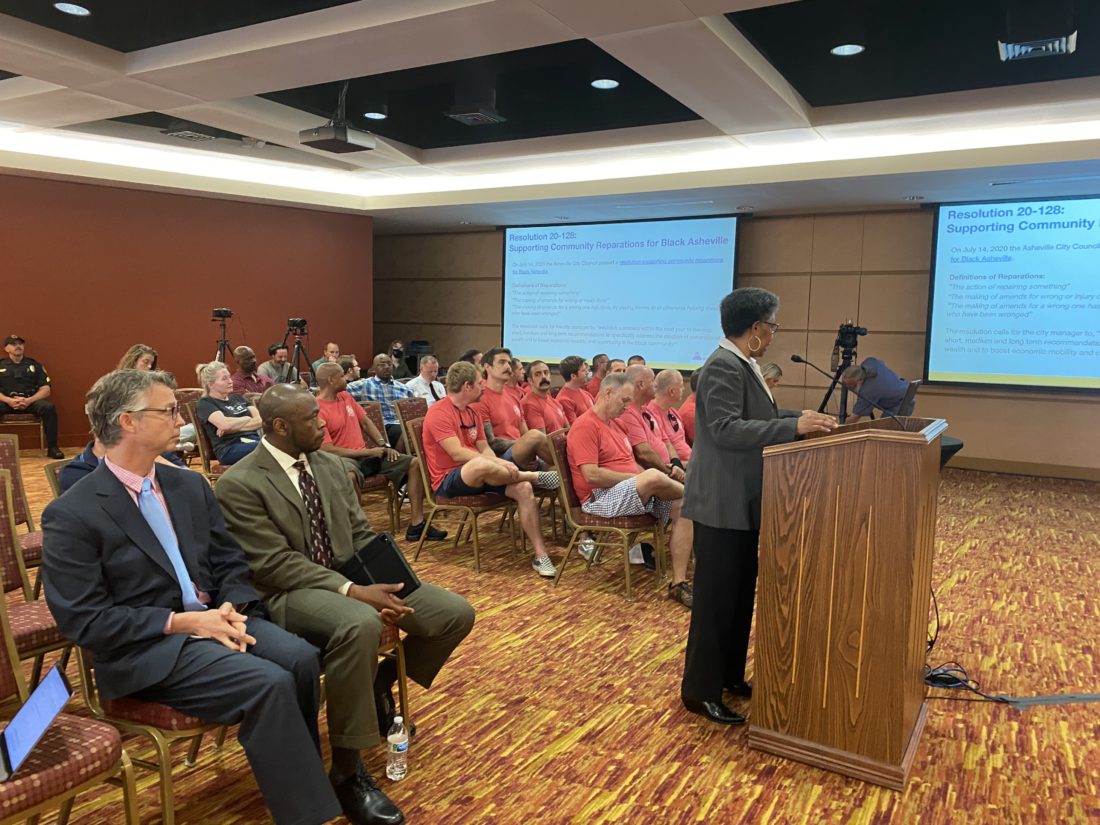Few seats were left empty in the Banquet Hall at Harrah’s Cherokee Center – Asheville as city staff, media and members of the public filed in for the first in-person regular meeting of Asheville City Council in more than a year.
The item at the June 8 meeting that drew the largest number of constituents was a public hearing on City Manager Debra Campbell’s proposed 2021-22 annual operating budget, which includes an effective property tax increase of 3 cents per $100 in valuation. Finance Director Tony McDowell said that the tax hike would raise $5.7 million, which would partially cover $9.9 million in new spending.
As in previous years, members of the public both applauded the city for funding long-promised initiatives and voiced concern over how other taxpayer money would be spent.
Asheville native Tashia Ethridge suggested that even as the city develops a reparations program to address the damage caused by systemic racism, the proposed tax hike would disproportionately affect minority homeowners. She called for cutting the Asheville’s police budget as a means of covering the city’s expenses.
“As I combed through the budget for the first time and saw that there was to be a property tax hike, and I saw that y’all are still funding the Asheville Police Department $30 million, I was angry,” Etheridge said. “Because once again, I believe that you have lied to my community and reiterated that you do not care for the well-being of Black and brown folk in this city.”
The proposed budget originally included $1.2 million, allocated from the city’s general fund balance, to kick-start Asheville’s reparations initiative. But in a separate resolution passed June 8, Council members voted unanimously to remove that funding and instead redirect $2.1 million to the program from the December sale of city-owned property to White Labs, a San Diego-based yeast manufacturer and brewpub.
How those funds will be spent has yet to be determined. The city is engaging in a three-phase process to create a joint Asheville-Buncombe County Reparations Commission that will be tasked with making short-, medium- and long-term recommendations for the program.
Meanwhile, Vicki Meath, executive director of Asheville-based nonprofit Just Economics, said that she supported a proposed $1.1 million to complete the evening service hour extensions outlined in the 2018 Transit Master Plan — originally scheduled for completion in fiscal year 2019-20 — as well as to increase frequency along two South Asheville bus routes. And Scott Mullins, president of the Asheville Fire Fighters Association, praised the city’s planned $6.7 million in additional employee compensation, which would boost starting pay for firefighters up to roughly $44,000 per year.
“Your firefighters appreciate, and are encouraged by, the amount of support we’ve seen from you all during all of these budget work sessions over these past few months,” Mullins said. “By enacting this budget, the city of Asheville employees will once again feel valued. There will be an instant boost in morale amongst city employees. And it will keep employees, especially firefighters, in Asheville.”
Council members have two weeks to modify the spending plan and tax rate before their scheduled vote on adopting the budget Tuesday, June 22.
In other news
Several commenters noted that while Asheville has continued to livestream meetings as Council moves to in-person proceedings, members of the public are no longer permitted to comment remotely through phone or videoconferencing.
“It’s a pleasure to be in the same room with all of you again. It’s a pleasure to hear you all say ‘Aye’ in unison. … However, after the year that we’ve been through, I think it’s incredibly important that we find the things that actually worked for us. And one of those was technology, like videoconferencing,” said resident Nina Tovish. “This is all a great improvement in accessibility and transparency. I strongly urge you to allow remote participation as we go forward in person.”
Mayor Esther Manheimer did not respond to a request for comment from Xpress to explain why remote public comment was no longer allowed or if the policy would be changed.



Before you comment
The comments section is here to provide a platform for civil dialogue on the issues we face together as a local community. Xpress is committed to offering this platform for all voices, but when the tone of the discussion gets nasty or strays off topic, we believe many people choose not to participate. Xpress editors are determined to moderate comments to ensure a constructive interchange is maintained. All comments judged not to be in keeping with the spirit of civil discourse will be removed and repeat violators will be banned. See here for our terms of service. Thank you for being part of this effort to promote respectful discussion.